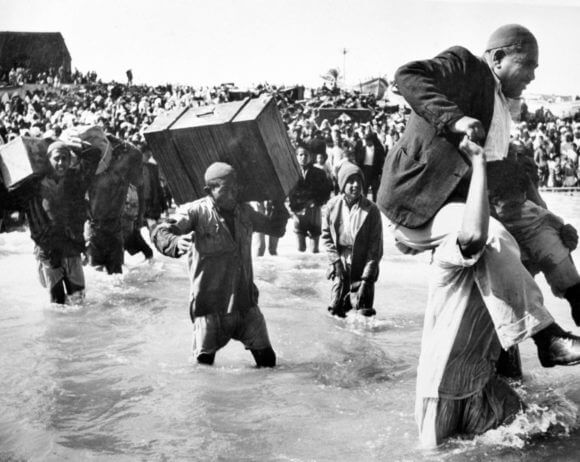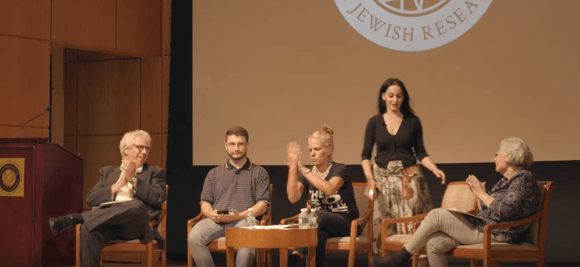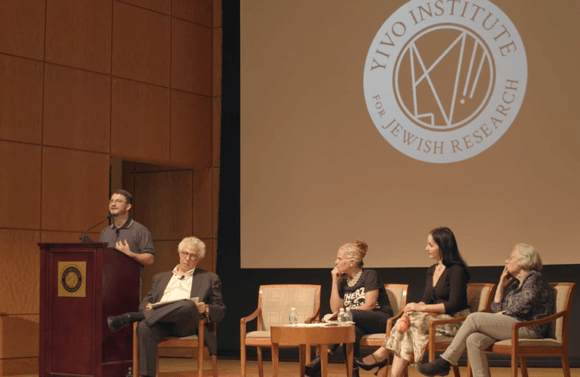The Jewish, secular, socialist, anti-Zionist Arbeiter Bund party of the old Russian Empire brought an overflow crowd last month to the auditorium at the Center for Jewish History on West 16th Street, New York City.
The YIVO Institute for Jewish Research held a September 16 panel discussion on “Bundism’s Influence Today” — on its alternative vision of being Jewish in the world, opposite to Zionism’s premise that genuine Jewish life yearns for Jewish political sovereignty.
“The General Jewish Labour Bund in Lithuania, Poland and Russia” union was founded in 1897, the same year as the first Zionist Congress in Basel.
The history of the Bund offers a contrast to the Zionist achievement of evicting Palestinians from their cities and villages, and indulging in Eretz Yisrael kitsch and fantasy.
“The Jewish Colonies in Palestine were Founded on the Catastrophe of the Arabs,” declared the title of a 1917 article by a Bundist writer in New York’s Forverts (Forward) newspaper — representing the Bund’s refusal from the start to ignore the rights of Arabs in Palestine who were in the way of the Zionist design.

The Bund’s history of fighting for workers’ rights, social equality and dignity, fostering Jewish autonomy and forming alliances, cruelly ended in the crucible of Bolshevik totalitarianism and Nazi predation of Poland.
Panel moderator Jack Jacobs said the Bund had a program that can be respected and replicated today, promoting a diaspora-oriented perspective as a nationally conscious group that is not nationalist, but rather Jewish and secular.
Instead of fixing on Palestine as the place of the Jewish future, the Bund approach was expressed in the slogan, “Where we are is our home.”
Jacobs told the audience that after the 1917 Revolution the Bund was first co-opted and ultimately proscribed by the Bolsheviks in Russia. He said:
In the newly independent state of Poland, on the other hand, the Bund flowered in the interwar years. It had enormous influence at that time within the Polish Jewish trade union movement. It helped to establish a network of secular Jewish day schools in which Yiddish was the language of instruction and it fostered a constellation of organizations including Bundist-oriented movements for children and youth, and for women.
Tens of thousands of Polish Jewish workers took courses, attended lectures, or participated in other cultural activities conducted under Bundist auspices.
During the 1930s, the Bund’s popularity and reach notably increased. By the end of that decade, Bundist candidates were regularly winning massive victories. In Polish municipal elections and in Jewish communal elections. When in 1936 the Bund called on Jewish workers to take part in a general strike, the Jewish areas of major Polish cities were shut tight.
In Warsaw, Poland’s largest city and the city with the largest Jewish population, the Bundist-dominated slate won 17 of the 20 Jewish seats in the last pre-war municipal elections….
The invasion of western Poland by Germany and eastern Poland by the USSR put an end to that era. Though a handful of Bundist leaders ultimately succeeded in escaping this death trap, many died or were killed while in Nazi or Soviet occupied regions.
…Surviving Bundists fostered Bundist organizations in many lands in the post-war years. Only a few of those organizations however succeeded in sustaining themselves as the major survivors died out. But the ideas of the Bund, or at least some of them, live on.
…After decades of being consigned by its opponents to the dustbin of history, Socialism is once again on the agenda in this country. The Democratic Socialists of America organization, the DSA, that had some 6000 members in 2015, has considerably more than 50,000 at this time, and the bulk of those that have entered the organization in the last couple of years are young people.
Jenny Romaine, a performer who had been a sound archivist at the YIVO Institute for Jewish Research for 13 years, gave a flavor of the Bund tradition, neither nationalist nor pious, another way of being Jewish, of doykeit (Yiddish) as the Bund put it, “here-ness,” what she calls “Jewish-is-as-Jewish-does” pluralism:
They were secular Jews. My (Bundist) grandfather would say, “We will now not say Shehecheyanu” [a prayer] — but they were dedicated to housing and building and cataloging and preserving the lives of every Jew around the world. So I felt I learned from the Bund, Jewish is as Jewish does, which is a love of that diversity.
Jacobs says that the Bund opposed the idea of building Jewish life in Palestine that would exist behind an iron wall:
In the period immediately before the war, the Bund began to distinguish between Zionism, which it opposed hook, line and sinker… and the legitimate rights of the Jewish community in Palestine, the Yishuv. They thought that, Look, there are Jews that live there, and Jews have a right to live there just as Jews have a right to live elsewhere. And they were perfectly prepared to defend those rights. And in the postwar period, the relatively modest number of surviving Bundists had to cope with the fact that an independent state had been declared. They weren’t in favor of it, but it had happened. And some of their friends, some of their family members, had moved there, and in any event there was a large Jewish community [there].
Into the 1970s, the dwindling numbers of surviving Bundists advocated for a bi-national state but adjusted to the idea of a two-state solution as a stepping stone.
…They continued to say, We oppose Zionism. We oppose the role that Zionists play in the diaspora. We oppose the ways that Zionism undermines and belittles Yiddish culture. We oppose the emphasis on aliyah. We oppose the notion that Israel should be central in Jewish life. There are other Jewish communities that have important needs. …We have to adapt, we have to take into account circumstances. And what that meant to them was openness to other solutions and possibilities.

Molly Crabapple brought the crowd to a pitch of excitement with her declaration,
I personally believe in one secular, democratic state where every person is treated like an equal citizen and has an equal vote. [Whoops and applause.] And incidentally, I would say that in 1948 after Israel was founded that those demands, the right of return for refugees and a state of equal rights for all, which are the basic demands of the BDS movement, were also the Bund’s demands for Israel.
Jacob Plitman, Publisher of Jewish Currents, said that his summers as a youth spent in a Camp Judea in the Appalachians armed him with “a very empowering form of American Jewish Poltical Zionism” — which did not survive his first encounter with Palestinians describing their experience with the consequences of the Zionist state.
This feeling of Israel-centricity of my entire life and Jewish being was shattered upon the encounter with Palestinians. It took only one conversation for this to start to erode after years and years of [summer] camp and having spent a gap year in Israel. I went to Bethlehem as a joke with my friend, just because we were not allowed to go.
As Balaam sent to curse the Israelites, Plitman instead was transformed by a human beauty he saw:
We went, we ended up meeting some activists that were there, and we thought it would be funny if we went on one one of those lefty self-hating tours, and on one of those tours we met an older couple who had survived something they called the nakba, a word I had never heard, and I heard a story reminiscent of my own family’s story of fleeing, and of danger and eventually of resilience inside this camp in Bethlehem that they had been living in for generations.
…this sort of experiences fueled multiple movements inside the Jewish community, who are battling for what the right sort of attitude to Israel is from the standpoint of a diaspora progressive Jew. The Bund, when one has these sort of experiences, interest in it makes a lot of sense because what the Bund does is provide a different history, it provides what a friend of mine calls an answer to the sense of orphan-ness that a lot of Jewish leftys have, that we have no yichus(lineage), and that I went to camp and then I abandoned my community, that I’ve been to the desert of leftism. And the Bund in many ways has an answer for that, and that’s been profoundly important to me and in my work with Jewish Currents.
So part of what has fueled this interest in me and I think in the audience is the crisis of Zionism, that is what is pouring fuel on this curiosity about Jewish leftism, socialism, revolution, etc.
The other half of course is that Israel is not the only place in crisis. We have our own crisis here at home. For many, the Trump era exposed the violence that was for some hidden under the surface. For many of us gone is the illusion that the State, any State, is our salvation. And this will be equally true whoever the next President or Prime Minister is.
These dual crises, the crisis of Zionism and the crisis of American capitalism, in terms of the idea of capitalism having failed Jews — we are under the exact same pressures of downward mobility and deindustrialization, deunionization and oppression as other folks — I think there are some myths about our inherent class uplift, which is certainly not true for working-class Jews and not true for Jews in general — these two crises, the crisis of Zionism and the crisis of American capitalism, that’s what’s framing this predicament. That’s why for me the Bund is interesting.
Speaking of the moneyed interests that have captive American Jewish organizations, Plitman stated flatly:
There is a ton of debate about what Jews are, whether a nation, civilization, a people, etc. To me what is important is the paucity, the almost total lack of forums to even have this debate in a serious way. I think it’s notable that hundreds of people will come to an event about the Bund.
But let’s say we all want to go vote about which of these words describe what Jews are. Where would you go? There are no democratic [representative] institutions inside the Jewish community. The community is by-and-large run by a donor class, like every other community is run by an oligarchy…. In this space (YIVO) what happens is we end up debating these political questions, but it [interest in the Bund] reflects the desire for a political space where we could decide such things.
Yiddish poet and Bund scholar Irena Klepfisz commented that as she came out as a lesbian, she allied with other left feminist Jews whose experience of being a secular Jew was “nothing” — that it meant no observance, embarassment by the the Hasidim, and that in contrast being raised by Bundist parents and their friends, she was grateful for a secular Judaism that was more than “nothing.”
Klepfisz may be mirroring the observation of Kurt Lewin, the psychologist who wrote in a 1940 essay about identity, included in his 1948 book Resolving Social Conflicts,
For the modern Jew there exists an additional factor to increase his uncertainty. He is frequently uncertain about the way he belongs to the Jewish group, and to what degree. Especially since religion has become a less important social matter, it is rather difficult to describe positively the character of the Jewish group as a whole. A religious group with many atheists? A Jewish race with a great diversity of racial qualities among its members? A nation without a state or a territory of its own containing the majority of its people? A group combined by one culture and tradition but actually having in most respects the different values and ideals of the nations in which it lives? There are, I think, few chores more bewildering than that of determining positively the character of the Jewish group…. No wonder many Jews are uncertain about what it means to belong to the Jewish group…
For Ashkenazi American Jews, the ties of Yiddish language and culture are quite attenuated by now. Unless “strictly” religious, assimilation runs deep. Maintaining Jewish identity has always required not mere survival, but a sense of mission and meaning in relation to gentiles, both in Palestine and the diaspora.
Since Abraham established circumcision as the marker of male membership, and the ever developing refinements of the definition and meaning of a Jew and Jews, the consciously hellenized and “assimilated” have contended with the draw to return to a supposed purity and genuineness of Jewishness.
Now that it has become clear that Zionism ends if not begins as a form of ethnosupremacism, no nobler than Magyar or Hindu, pursuit of justice and rediscovery of the tradition of the Bund might be seen a wholesome development.



My grandmother was born in 1895 in Smorgon, an industrial town in NW Belarus and a Bund stronghold. She remembered the excitement of going to secret nighttime meetings of the Bund in the forest as a young girl. In 1914 Smorgon went up in flames during the pogroms that drove Jews (then suspected of loyalty to Germany) away from the front and into the interior. My grandmother and her sister, sole survivors in their family, joined the column of Smorgon refugees and ended up in Kharkov, where my father was born in 1919.
After October 1917 the Bund in Russia split into two factions on the basis of willingness or unwillingness to ally with the Bolsheviks. The pro-Bolshevik Bundists were swallowed by the Communist Party, all its members being admitted as CP members. The opposing faction was repressed.
Another relevant chapter in the history of the Bund is the activity of Bundists in the DP camps after WW2. In opposition to the Zionist demand to “open the gates of Palestine” they raised the slogan: “Open all the gates!” They were beaten and forcibly silenced by Zionist goons.
Eran Torbiner has made a moving film about the Bund in Israel (https://www.youtube.com/watch?v=SvmcRKvyrWk). Unfortunately, the Israeli Bundists appear all to be elderly people.
During its early years political Zionism had little support within world Jewry. Most did not believe the solution to anti-Semitism was for Jews to leave the country in which they lived and create a new “homeland” in Palestine. What became Eastern Europe’s most influential Jewish organization opposed to Zionism was founded in 1897. Known as the Bund or Jewish Workers League, it rejected the rabbinical tradition (as did Zionism) and hoped to combine socialism with a secular Jewish nationalism based on Yiddish customs which they considered to be the authentic Jewish culture. Members of the Bund believed in cultural autonomy and aspired to create a better life for Jews in Eastern Europe. In their view Zionism was “[A] bourgeois ideology, a reactionary regression from progress….” Inevitably, the Bund was vilified by the rabbinical establishment, the Zionists and the Russian social democrats, but it remained active in Eastern Europe (especially Poland) until silenced by the Nazis. (Benjamim Beit-Hallahmi, Original Sins, p. 47)
A little late for such a realization. And do we really need another “ism” to contend with.
As long as Jewish elites continue to push support for Israel and Jewish Communities keep on forking over the monies to support the Israeli state, nothing will change.
Another panel, another pronouncement… Big deal!
Without intending at all to belittle the splendid work done by the Bund in its time, the text above is a head-spinning bundle of stark internal contradictions due to the recent celebrants, in the same large bowl of soup
First the “Jewish” nationalism. The presenters seem to be miles away from the Bund’s understanding of then, aptly summarized in its name:
“The General Jewish Labour Bund in Lithuania, Poland and Russia”. This is very specifically an Ashkenazi ethnic identity, clearly expressed by the attachment to Yiddish language, their schools and their culture.
This is in stark contrast to today’s Zionism-obnubilated person who says: “They were secular Jews”. They very clearly used the word “Jewish”, if we’re speaking English, in the meaning of Ashkenaze. Not today’s usage! Today’s usage is clearly that of a religion-independent nominal-religious tribality with no common culture or language. See next sentence:
“My (Bundist) grandfather would say, “We will now not say Shehecheyanu” [a prayer]”. As for: “but they were dedicated to housing and building and cataloging and preserving the lives of every Jew around the world”,
This is in total contrast to whatever the crystal-clear Bundist differentiation between Jiddisch and Jüdisch expresses.
“So I felt I learned from the Bund, Jewish is as Jewish does, which is a love of that diversity…” well perhaps, but we are not talking of a diversity of language, culture etc. It all remains Ashkenazi.
“The Bund’s history of fighting for workers’ rights, social equality and dignity, fostering Jewish autonomy and forming alliances, cruelly ended in the crucible of Bolshevik totalitarianism and Nazi predation of Poland.”
Now this is the most nauseating part, trying to create a Nazi equivalence: even in this article, it is recognized that at the revolution, “The pro-Bolshevik Bundists were swallowed by the Communist Party, all its members being admitted as CP members.” All the Bund members…
And then it comes back as:
“a program that can be respected and replicated today, promoting a diaspora-oriented perspective as a nationally conscious group that is not nationalist, but rather Jewish and secular”
Yiddisch and secular… how hard can it be to understand that? Tell me that the Bund is a Falasha organization, will you? Absurd.
All this is obviously geared to smuggling in the following:
“And incidentally, I would say that in 1948 after Israel was founded that those demands, the right of return for refugees and a state of equal rights for all, which are the basic demands of the BDS movement, were also the Bund’s demands for Israel…”
Is there any proof of a unanimity, or at least majority opinion, among the Bund to accept “equal rights” for the invading Zionist bandits, equal to those of the owners of the country, who clearly expressed their opposition to such invasion? At least the Bund members that I had the honor to meet did not use that dishonest Zionist propaganda.
So a Bund commemoration meeting that altogether ends with feelgood critique of Zionism and, constrasting with this, a reaffirmation of Zionist “rights” and Zionist “Jewish peoplehood”.
Every so often there is a mentioning of the Bund in the Mondoweiss. Obviously, the only reason for mentioning this chapter of Jewish activism is the fact that the Bund was anti-Zionist. However, it should be noted that the Bund – just like Zionism – defined the Jews as a nation, not a religious community. Today’s anti-Zionist world tries to present the case that “Jewish” is only about religion, but actually the Bundists understood that the Jews are a people, just like the Poles or the Russians. They opposed the founding of a Jewish state, but they certainly understood correctly the meaning of the terminology: a Jewish state is parallel to a Polish state or a Norwegian state. After the Holocaust in an 1948 Bundist conference, the Bund called for a binational (Jewish-Arab) state in Palestine. “Binational” means that there are two nations in Palestine, the Jews and the Arabs.
In 1955, there was a third world Bund conference in Montreal. The conference affirmed the significance of Israel; and in subsequent Bund statements, the movement expressed its support for the security and well-being of Israel (even while expressing criticism). Such a point of view should be brought to the attention of the readers. Generally, the anti-Zionists became non-Zionists in the wake of the founding of Israel; i.e. they had opposed the founding of a Jewish state, but once it was founded they accepted the new reality and wished its inhabitants well.
Finally, it is worthy of mention that the slogan of the Bund, as mentioned in the article, was “where we are is our home”. In Yiddish, it was in one word: “doykeit”. For millions of Jews today, “we are here” is Israel. The Bund has become a marginal phenomenon in today’s Jewish world, but if Mondoweiss feels that it’s worthy of mention in the here and now, let’s present the full picture. The ideology of the Bund defines the Jews as a national group, the reality of “we are here” surely includes the millions of Jews in Israel – and we wish them the very best.